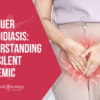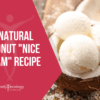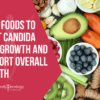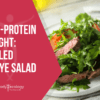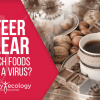What May Be Increasing Your Risk for Colon Cancer
Of all cancers that affect both men and women, colon cancer is the second leading cancer killer in the United States.
Diet plays an important role in our risk for cancer. It is not just diet that matters, but what diet does to the inner ecosystem in our gut that matters most.
Our inner ecosystem is the small world of bacteria, yeast, and even parasites that live alongside the cells lining the intestinal tract.
When the inner ecosystem is diseased or out of balance, yeast or bacteria can grow out of control. The cells along the intestinal lining can grow sick and inflamed, creating more problems and more opportunity for disease.
An inner ecosystem that is full of good bacteria in (mostly) the large intestine helps to promote health and a balanced response from the immune system.
Research is finding that our inner ecosystem may directly influence our chances of developing colon cancer. When gut bacteria are exposed to constant inflammation, bad gut bacteria thrive. These bad gut bacteria help make the environment in the gut toxic and fuel the growth of intestinal tumors.
Unfriendly Bacteria Thrive When the Body Is Sick
Healing the gut from inflammation can help to prevent colon cancer. A thriving inner ecosystem with friendly bacteria in the large intestine can support health and a balanced immune response.
Last year, researchers published a study in Science that looked closely at mice that had lost the ability to counteract any inflammatory response in the body. These mice were genetically designed to see every microbe—friendly or unfriendly—as a threat. (1)
Scientists then added a known carcinogen called azoxymethane to their environment. They did the same to mice that were left alone and had no genetic modification.
Only the mice whose immune systems had been genetically programmed to overreact eventually developed cancer.
This is because these mice had lost diversity in their inner ecosystem, meaning that only a few species survived. A hyper-vigilant immune system also meant that the intestinal cells were more prone to inflammation.
The few species of bad bacteria that were able to live in such an environment actually thrived on chemicals that the body produces when it is stressed and inflamed. (2) These bad bacteria did so well that they were able take over and irritate the cells lining the intestinal wall.
Little tumors began popping up under these colonies of bad bacteria in the gut.
Other similar studies in mice have found that when you set the gut up to house unfriendly bacteria, it is more likely to get sick, inflamed, and develop colon cancer. (3)
Even when scientists moved colonies of bacteria from the diseased mice into healthy mice, they found that the new mice still developed cancer. Likewise, moving bacteria from the intestines of healthy mice into the diseased mice encouraged the intestines to heal and prevented the development of colon cancer.
One of the Best Ways to Help Prevent Colon Cancer
While not all of us may have a hearty and healthy inner ecosystem, we can gently coax the good bacteria in the gut to flourish while starving harmful yeast and bacteria.
The way doctors currently control intestinal inflammation is with antibiotic therapy, corticosteroids, or other powerful drugs that manipulate the immune system. But long-term side effects can limit the use of these drugs—not to mention the side effects on the inner ecosystem.
When we are born, we are immediately inoculated with beneficial bacteria from the mother’s birth canal. If we are born through a Cesarean-section delivery, we are instead inoculated by bacteria from human skin.
Research tells us that how we are born shapes our health into adulthood. Whether we were nursed with breast milk and whether we grew up in an urban or non-urban environment matters too. This has everything to do with the bacteria living in the gut.
Research also suggests that the Standard American Diet (SAD), which often contains too many cooked saturated fats, is pro-inflammatory. (4) This means that it can (and often does) contribute to intestinal inflammation and eventually colon cancer.
This is why we suggest the Principle of 80/20, which tells us to:
- Eat only until 80% full.
- Make sure that 80% of our plate is filled with non-starchy vegetables and ocean vegetables.
In spite of how we were born, our history of antibiotic use, or our past diet—we can still restore the precious inner ecosystem in the gut to one that is robust and healthy.
To heal the gut, Donna has created the Digestive Care Multi. To restore the inner ecosystem, it is crucial to not only cleanse pathogens and toxins but also heal the intestinal lining itself and repopulate with very specific strains of bacteria and beneficial yeast.
Donna also recommends eating fermented vegetables with every meal to introduce additional probiotic strains and ensure optimal digestion.
What To Remember Most About This Article:
Colon cancer is the second leading cancer killer for men and women in the US and directly relates to the health of your inner ecosystem. Bad bacteria can develop when gut bacteria are exposed to constant inflammation to make the gut toxic and fuel tumor growth.
Many doctors try to control this intestinal inflammation with drugs like antibiotics and corticosteroids, which aren’t designed for long-term use. Your gut health is also directly affected by how you were born, whether vaginally or via C-section. A vaginal birth coats a newborn baby’s skin in beneficial bacteria from the mother’s birth canal; a C-section coats a baby in bacteria from human skin.
Even worse, eating the Standard American Diet rich in saturated fats can contribute to intestinal inflammation and potentially to colon cancer. For this reason, supporting your inner ecosystem is a top priority by:
- Healing the gut with the Digestive Care Multi to cleanse pathogens and toxins.
- Eating fermented vegetables at every meal to inoculate the gut with beneficial bacteria.
- [product id=”115″]
- [product id=”1″]
REFERENCES:
- C Jobin, et al. Intestinal Inflammation Targets Cancer-Inducing Activity of the Microbiota. Science. 5 October 2012; 338 (6103): 120-123.Published online 16 August 2012 doi:10.1126/science.1224820
- M Chamaillard, et al. NOD2-mediated dysbiosis predisposes mice to transmissible colitis and colorectal cancer. J Clin Invest. 2013; 123(2):700–711 doi:10.1172/JCI62236
- AJ Bäumler, et al. Host-Derived Nitrate Boosts Growth of E. coli in the Inflamed Gut. Science. 8 February 2013; 339 (6120): 708-711. doi:10.1126/science.1232467
- EB Chang, et al. Dietary-fat-induced taurocholic acid promotes pathobiont expansion and colitis in Il10-/- mice. Nature. 2012 Jul 5;487(7405):104-8. doi: 10.1038/nature11225.


